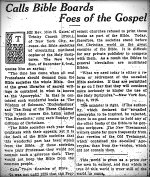Those church councils decided your New Testament. So again, you’re being dishonest.
I don't believe the church councils "decided" the New Testament. Even during the 4th Century there were difference in the church as to what made up the New Testament. Up until that point several influential people had given their opinion on what books make up the New Testament. A few local councils, like Rome and Carthage, had given their opinions. Some local councils in the East had given their list of books, that was slightly different than the Western Churches. And finally in the 5th Century a consensus developed on the 27 books of the New Testament we have today. I believe the last book to be "canonized" in the East was Revelation, that occurred in the late 4th or early 5th Century. At that point we had a true universal NT canon, because
almost all Christians everywhere agreed on the same 27 books. The only church I'm aware of that has a different NT canon is the Ethiopian Orthodox church. They have the same 27 books as the rest of us but add 8 additional books.
28. Sirate Tsion (the book of order)
29. Tizaz (the book of Herald)
30. Gitsew
31. Abtilis
32. The I book of Dominos
33. The II book of Dominos
34. The book of Clement
35. Didascalia
A true New Testament canon didn't occur because a person or council decided the canon. It occurred because the 27 books became universally accepted by churches in both the West and the East. I don't consider the 8 extra books of the Ethiopians to be "Canon" because they are not universally accepted by the rest of Christianity.
The Old Testament books are a different story. Even after the Councils of Rome and Carthage there was debate/differing opinions within the church over the status of the Duetero books.
We have Gregory the Great in the 6th century saying Macabees is not part of the Canon. He was the Bishop of Rome and surely new of the opinions of the Rome and Carthage Councils and that of Augustine. Yet he clearly states that Macabees is not part of the canon.
Here is a list of Catholic Theologians who rejected all or part of the Deuteo Books after the 5th Century and Before Trent. Keep in mind this is just a partial list that is recorded in antiquity. Who knows how many Bishops and Theologians held the same position? Logic tells us it is way more than the ones listed here. These were leaders in the church who passed their teachings on to maybe thousands of students. And while I can also give an even longer list of Bishops and Theologians who affirm the Duetero books, the fact that these prominent historical figures even are on record shows that there was still controversy over the Old Testament "canon" in the Western Church up until the time of the Reformation. No such controversy existed for the New Testament books.
Gregory the Great- Pope, considered by many to be the first "true" Pope in that he was followed by not only the Western Church but also by the Eastern Church.
The Venerable Bede-Doctor of the Church, 8th Century Monk
Ambrose of Autpert, a ninth-century theologian,
Hugh of St. Victor, 12th Century Theologian
John of Salisbury, 12th Century Theologian
Nicholas of Lyra-14th Century Franciscan, noted Bible Scholar
William of Ockham, 14th Century Franciscan Friar, famous philosopher and theologian
Cardinal Cajetan, prosecutor of Martin Luther, lobbied against the Duetero inclusion in the Canon at Trent
Glossa ordinaria- commentary used by the Catholic Church during the Middle Ages that was widely read and studied by Theologians.
“
The canonical books have been brought about through the dictation of the Holy Spirit. It is not known, however, at which time or by which authors the non-canonical or apocryphal books were produced. Since, nevertheless, they are very good and useful, and nothing is found in them which contradicts the canonical books, the church reads them and permits them to be read by the faithful for devotion and edification. Their authority, however, is not considered adequate for proving those things which come into doubt or contention, or for confirming the authority of ecclesiastical dogma, as blessed Jerome states in his prologue to Judith and to the books of Solomon. But the canonical books are of such authority that whatever is contained therein is held to be true firmly and indisputably, and likewise that which is clearly demonstrated from them.”
Early Reformers were following the Catholic teaching of the Glossa Ordinaria and a long history of teaching from Catholic Theologians.

